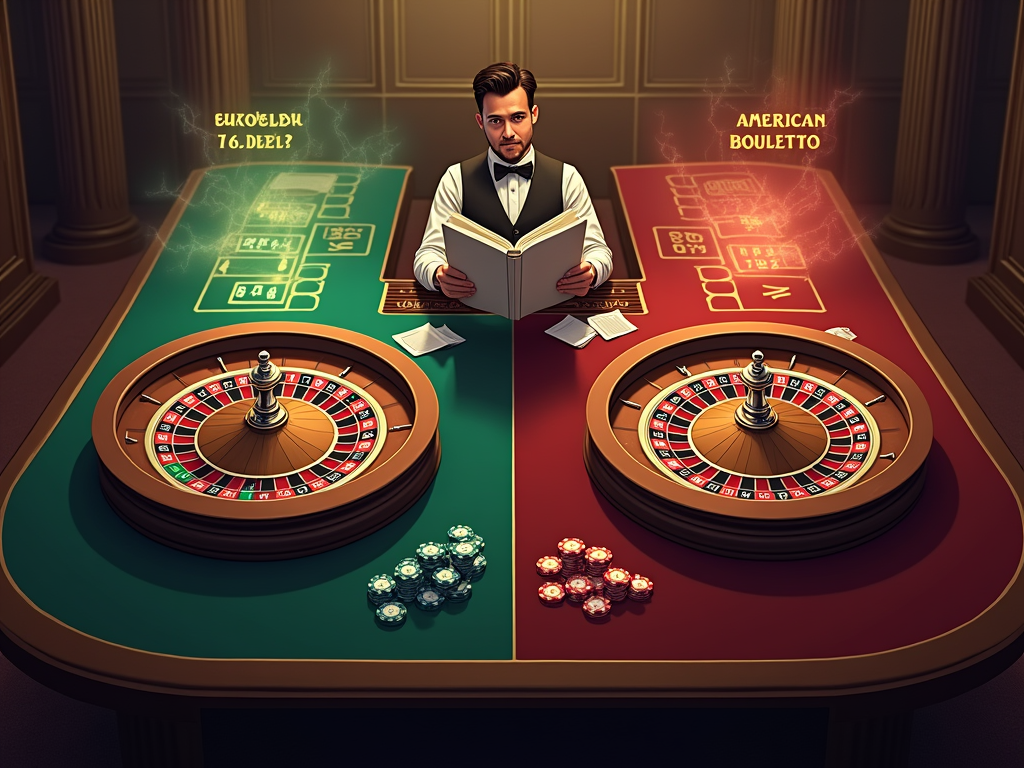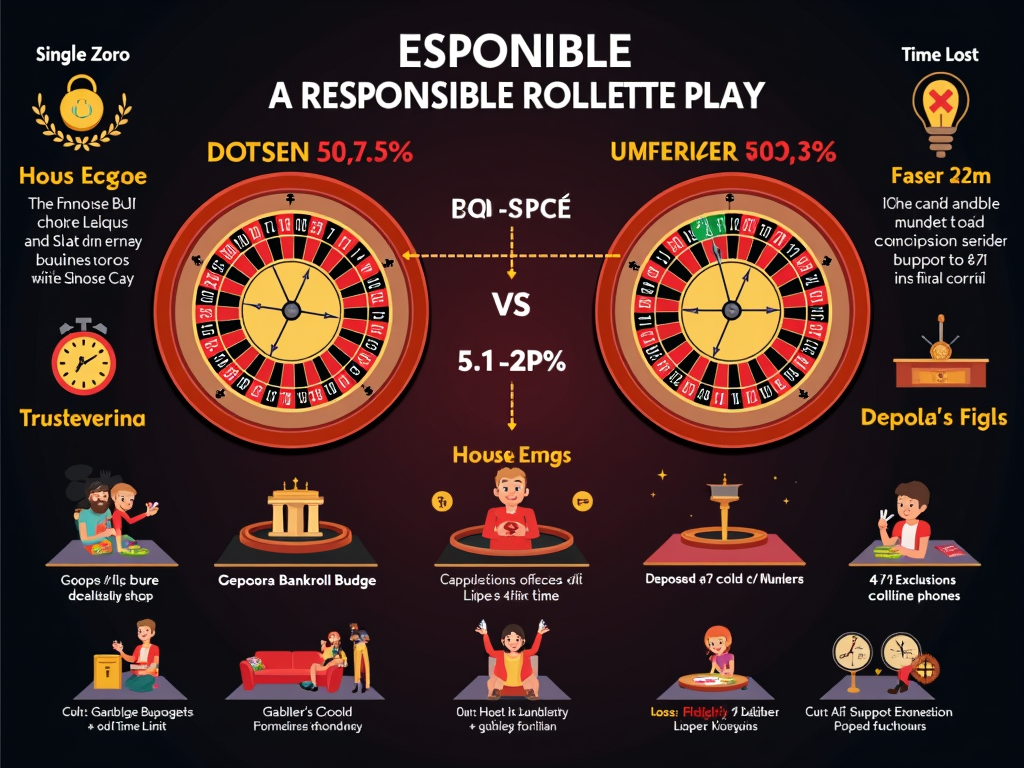Smart and Responsible Roulette Play
I approach playing roulette by combining mathematical knowledge with strict personal boundaries to maintain control. European Roulette provides better odds with a 2.7% house edge compared to American Roulette‘s 5.26%, so I strategically select the games I play and enforce time and budget limits.
Key Takeaways
- Set a dedicated gambling bankroll separate from essential living expenses
- Use casino tools like deposit limits, reality checks, and time management features
- Never chase losses or borrow money for gambling purposes
- Monitor warning signs like spending beyond your budget or difficulty walking away
- Choose European Roulette over American Roulette for better odds and longer play time
I maintain control by keeping my gambling fund completely separate from my living expenses. The built-in casino tools help enforce my boundaries — deposit caps prevent overspending, while automated reminders track how much time I spend playing.
I take the warning signs of problem gambling seriously. Spending more than my budget, chasing losses, or having difficulty stepping away are clear signals that it’s time to stop and reflect. I never borrow money to gamble.
European Roulette‘s lower house edge helps stretch my bankroll further than American Roulette. This intentional and informed choice allows me to enjoy extended entertainment while minimizing potential loss. The key is to play smart and remain firmly within my limits.
Why Roulette Odds Matter for Responsible Play
I believe understanding the math behind roulette betting strategies and odds is crucial for smart gambling. Let’s break down the key differences between European and American Roulette that affect your chances of winning.
Breaking Down the House Edge
European Roulette gives you better odds with its 2.7% house edge, while American Roulette‘s extra double zero pocket pushes that edge up to 5.26%. This means you’ll lose money faster playing American Roulette — it’s just simple math.
Here’s what you need to know about roulette probabilities:
- Straight Up bets (single number) have a 1 in 37 chance on European tables and 1 in 38 on American tables
- Even Money bets like Red/Black offer 48.65% probability on European wheels
- Those same Even Money bets drop to 47.37% on American tables due to the extra zero
- Each spin stands alone — previous results don’t impact what happens next
I can’t stress enough how important this last point is. Many players fall into the trap of thinking they can predict outcomes based on past spins. That’s called the gambler’s fallacy and it’s a sure way to lose money fast.
By knowing these odds, you can make smarter choices about which table to play. I always recommend European Roulette over American when possible — that lower house edge means your bankroll should last longer. This ties directly into good bankroll management techniques that help keep gambling fun and controlled.
The cold hard truth is that the house always has an edge. That’s why setting strict betting limits and time constraints is essential. When you understand the real odds, you’re better equipped to play within your means and avoid chasing losses — the hallmark of responsible gambling.

Setting Smart Limits Before You Play
Money management sits at the core of responsible roulette betting strategy. I strongly recommend creating a dedicated gambling bankroll that’s completely separate from your essential living expenses – this means rent, bills, groceries, and savings should never be touched for gambling purposes.
Creating Your Gambling Budget
Before placing your first bet, you’ll need clear financial boundaries. Here’s what I’ve found works best for maintaining control:
- Set a fixed monthly gambling budget from your disposable income
- Establish daily deposit limits that align with your monthly budget
- Create loss limits – once reached, stop playing for that session
- Track your time with mobile alarms or casino-provided tools
- Use only money you can afford to lose entirely
Think of your gambling budget like a movie or concert ticket – it’s entertainment money, not an investment strategy. Just as I wouldn’t spend my rent money on concert tickets, I make sure to never use essential funds for betting activities.
One of the biggest mistakes I see players make is chasing losses – that’s when you increase your bets to try recovering previous losses. This often leads to even bigger losses and can spiral into problem gambling. Instead, stick to your predetermined limits regardless of whether you’re winning or losing.
Modern online casinos offer excellent tools to help maintain these boundaries. I recommend using their deposit limiters, reality checks, and time management features. These act as guardrails to keep your play fun and controlled. Setting up these limits takes just a few minutes but can save hours of stress and financial strain later.
Borrowing money for gambling is strictly off-limits. If you can’t afford to play with your own disposable income, that’s a clear sign to step away. I’ve learned that responsible gambling starts with honest self-assessment and firm boundaries. By treating roulette as pure entertainment rather than a moneymaking venture, you’ll make smarter decisions and enjoy the game more.

Warning Signs and Self-Assessment
I’ve seen how the excitement of playing roulette at the casino can sometimes blur the line between entertainment and problematic behavior. While most players can enjoy the game responsibly, approximately 1-2% of adults develop severe gambling issues that require attention.
Key Warning Signs to Monitor
Before diving deeper into the casino floor, it’s crucial to recognize potential red flags in gambling behavior. Here are the essential warning signs that shouldn’t be ignored:
- Spending beyond your planned budget and chasing losses
- Finding it hard to walk away from the roulette table
- Constantly thinking about your next gambling session
- Needing to increase bet sizes to feel the same thrill
- Missing work or important commitments due to gambling
- Using gambling as an escape from stress or depression
- Experiencing guilt or anxiety after playing
Just like managing your bankroll in blackjack, self-awareness in roulette is essential. If you’re noticing these signs in your playing habits, it’s time to step back and reassess your relationship with gambling. These indicators don’t necessarily mean you have a gambling problem, but they serve as valuable checkpoints for maintaining healthy gaming habits.
The impact of problematic gambling extends beyond the casino floor. Your relationships might suffer, work performance could decline, and financial stability may become compromised. I’ve found that keeping a detailed record of time and money spent on gambling can help track these patterns effectively. Consider setting up automatic alerts or time limits through your casino account – similar to how you’d manage your bankroll in baccarat.
If gambling starts feeling like a need rather than entertainment, or if you’re hiding your activities from loved ones, these are serious signals that shouldn’t be ignored. Many casinos offer self-assessment tools and resources for players who want to evaluate their gambling behavior objectively. Taking regular breaks, setting strict time limits, and maintaining other hobbies and interests help create a balanced approach to casino gaming.
Tools and Technology for Staying in Control
I’ve found that modern gambling platforms offer several helpful tools to maintain control while playing roulette. Setting deposit limits has been a game-changer for many players, letting you decide exactly how much money you can add to your account daily, weekly, or monthly. It’s like creating a spending budget—once you hit your limit, you can’t deposit more until the time period resets.
Essential Control Features for Smart Play
Loss limits are another crucial feature that I recommend activating. These guardrails prevent you from losing more than a predetermined amount during your chosen timeframe. Here are the key tools you should consider using:
- Reality check notifications – These pop-up reminders show how long you’ve been playing and your win/loss status
- Session time limits – Set maximum playing durations to avoid getting caught up in extended sessions
- Cool-down periods – Take short breaks from gambling when needed
- Self-exclusion options – Block access to your account for 6 months or longer if needed
For players seeking additional protection, I’ve seen external blocking software make a real difference. Programs like Gamban, BetBlocker, and NetNanny act as barriers between you and gambling websites when you need stronger boundaries.
These tools work together with smart roulette betting strategies to keep your gameplay healthy and enjoyable. Just like you’d use effective bankroll management in blackjack, these control features help maintain discipline while playing roulette.
I always tell players that using these tools isn’t a sign of weakness—it’s actually a mark of a smart, self-aware gambler who wants to protect their bankroll and maintain the fun factor. The best time to set up these controls is before you start playing, when you can think clearly about your limits and goals.
The technology behind these tools keeps improving, making them more user-friendly and harder to circumvent. Most reputable online casinos now integrate these features directly into their platforms, putting responsible gambling options right at your fingertips. By combining these tools with solid betting fundamentals, you’re setting yourself up for a more controlled and enjoyable gaming experience.

Common Myths vs Reality
Let’s separate fact from fiction in roulette. I’ve noticed many players get caught up in betting systems they think will beat the casino’s built-in advantage. While roulette betting strategies can be exciting, none of them can overcome the house edge.
Breaking Down Popular Misconceptions
The Gambler’s Fallacy is perhaps the most persistent myth in roulette. You might’ve seen players frantically jotting down numbers after watching five black numbers hit in a row, convinced that red is ‘due’ next. Here’s the truth: each spin is independent. The probability of hitting red remains at 48.6% regardless of previous outcomes.
Consider these common misconceptions that can impact your gameplay:
- Betting systems like Martingale or Fibonacci can guarantee wins
- Certain numbers are ‘hot’ or ‘cold’
- Previous spins influence future results
- Specific times of day offer better odds
- Online roulette results aren’t truly random
Instead of chasing these myths, I recommend focusing on proven strategies for smart bankroll management and understanding the actual odds. Remember, roulette is a game of chance – not skill or pattern recognition.
The reality is that successful betting requires accepting randomness rather than fighting it. Each spin of the wheel is a fresh start with the same odds as the last. No amount of note-taking, pattern tracking, or system betting can change this fundamental truth.
I find that players who accept this reality tend to make better decisions at the table. They set clear limits, stick to their budgets, and don’t chase losses trying to force wins through supposed patterns or systems. This approach to roulette isn’t just more responsible – it’s also more enjoyable, as you’re playing the game as it’s meant to be played rather than fighting against its inherent nature.
Your success at the roulette table doesn’t depend on finding the perfect betting system or cracking some hidden code. Instead, it comes from understanding the true odds, managing your money wisely, and knowing when to step away. These principles form the foundation of responsible gambling and will serve you better than any betting system ever could.

Help is Always Available
When gambling stops being fun, reaching out for support can make a real difference. While I enjoy playing roulette responsibly, I understand that some players might need additional support to maintain healthy gambling habits.
Immediate Support Services
Professional help is just a phone call away through the National Problem Gambling Helpline at 1-800-GAMBLER. This 24/7 service connects you with trained counselors who provide immediate assistance and guidance. GamCare offers free, confidential support and practical solutions for anyone affected by gambling concerns.
Community and Professional Resources
Here are the key support options available:
- Gamblers Anonymous meetings provide peer support and a proven 12-step recovery program
- Professional counseling services specific to gambling-related challenges
- Treatment programs tailored to individual needs and circumstances
- Family support groups and resources for concerned loved ones
- Self-exclusion programs from both online and physical gambling venues
- Financial counseling to help manage gambling-related money issues
I’ve found that effective bankroll management strategies can help prevent gambling problems before they start. However, if you’re worried about your gambling habits or those of someone close to you, don’t hesitate to use these support services. They’re staffed by caring professionals who understand gambling challenges and won’t pass judgment.
The support extends beyond just the individual experiencing difficulties. Family members and friends can access specialized guidance on supporting their loved ones through organizations like GamCare. These services help create a support network that’s crucial for long-term recovery and maintaining healthy gambling practices.
Remember that seeking help isn’t a sign of weakness – it’s a smart step toward regaining control. These resources are available 24/7, and many offer anonymous support options if you prefer to maintain privacy while getting help.

Sources:
National Council on Problem Gambling (NCPG)
GamCare
BeGambleAware
UK Gambling Commission
American Gaming Association (AGA)
Journal of Gambling Studies
Addiction
Responsible Gambling Council (Canada)





